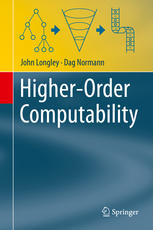

Most ebook files are in PDF format, so you can easily read them using various software such as Foxit Reader or directly on the Google Chrome browser.
Some ebook files are released by publishers in other formats such as .awz, .mobi, .epub, .fb2, etc. You may need to install specific software to read these formats on mobile/PC, such as Calibre.
Please read the tutorial at this link: https://ebookbell.com/faq
We offer FREE conversion to the popular formats you request; however, this may take some time. Therefore, right after payment, please email us, and we will try to provide the service as quickly as possible.
For some exceptional file formats or broken links (if any), please refrain from opening any disputes. Instead, email us first, and we will try to assist within a maximum of 6 hours.
EbookBell Team

4.4
32 reviewsThis book offers a self-contained exposition of the theory of computability in a higher-order context, where 'computable operations' may themselves be passed as arguments to other computable operations. The subject originated in the 1950s with the work of Kleene, Kreisel and others, and has since expanded in many different directions under the influence of workers from both mathematical logic and computer science. The ideas of higher-order computability have proved valuable both for elucidating the constructive content of logical systems, and for investigating the expressive power of various higher-order programming languages.
In contrast to the well-known situation for first-order functions, it turns out that at higher types there are several different notions of computability competing for our attention, and each of these has given rise to its own strand of research. In this book, the authors offer an integrated treatment that draws together many of these strands within a unifying framework, revealing not only the range of possible computability concepts but the relationships between them.
The book will serve as an ideal introduction to the field for beginning graduate students, as well as a reference for advanced researchers